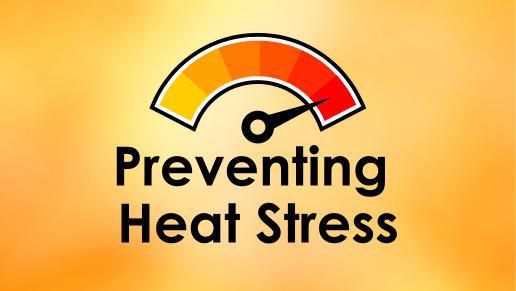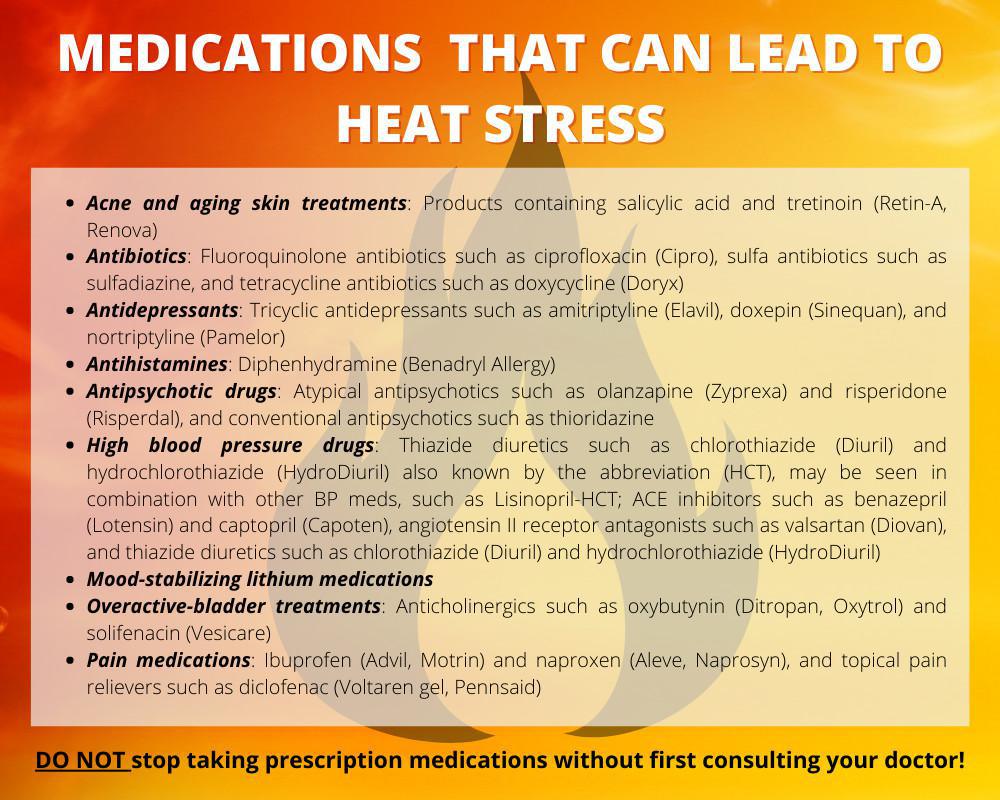With some of the hottest days of summer upon us, Ingalls wants to remind shipbuilders that multiple factors can contribute to heat stress.
While dehydration can result in heat stress, heat-related incidents can also be a result of your age, underlying health conditions, and medications you may already be taking.
In fact, the side effects of many medications, including common over-the-counter drugs such as ibuprofen and allergy medications containing diphenhydramine, can increase your sensitivity to heat.
It’s important to note that you should never stop taking prescription medication without first consulting your doctor. Just be aware of how your medication may affect you while working in high temperatures so you can take steps to be safe.
Some medications can also make your skin more sensitive to sunlight. Some can affect your body’s ability to regulate its own temperature, or limit your ability to perceive how hot you’re getting, so you may not realize you’re overheating. Other drugs can alter people’s ability to redirect blood flow to the skin, which is a primary way the body cools itself off.
Medications can also increase your risk of dehydration. Some types of drugs, notably diuretics, increase urine output, which can make it more difficult to stay hydrated.
Drugs that can increase your sensitivity to heat include (though aren’t limited to):
- Antidepressants: tricyclic antidepressants such as amitriptyline (Elavil), doxepin (Sinequan), and nortriptyline (Pamelor).
- Antihistamines: diphenhydramine (Benadryl Allergy).
- Antipsychotic drugs: atypical antipsychotics such as olanzapine (Zyprexa) and risperidone (Risperdal), and conventional antipsychotics such as thioridazine.
- High blood pressure drugs: thiazide diuretics such as chlorothiazide (Diuril) and hydrochlorothiazide (HydroDiuril) also known by the abbreviation HCT, may be seen in combination with other meds, such as Lisinopril-HCT. (These meds tend to dehydrate you.)
- Overactive-bladder treatments: anticholinergics such as oxybutynin (Ditropan, Oxytrol) and solifenacin (Vesicare).
- Mood-stabilizing lithium medications.
Some medications can make your skin more sensitive to sunlight, a reaction known as photosensitivity. Photosensitivity can manifest in a few different ways. Most commonly, it can lead to a rash that can look like a bad sunburn, and can appear within minutes of sun exposure.
Drugs that can increase your sensitivity to sunlight include (though aren’t limited to):
- Acne and aging skin treatments: products containing salicylic acid and tretinoin (Retin-A, Renova).
- Antibiotics: fluoroquinolone antibiotics such as ciprofloxacin (Cipro), sulfa antibiotics such as sulfadiazine, and tetracycline antibiotics such as doxycycline (Doryx).
- Antidepressants: tricyclic antidepressants such as amitriptyline (Elavil), doxepin (Sinequan), and nortriptyline (Pamelor).
- High blood pressure drugs: ACE inhibitors such as benazepril (Lotensin) and captopril (Capoten), angiotensin II receptor antagonists such as valsartan (Diovan), and thiazide diuretics such as chlorothiazide (Diuril) and hydrochlorothiazide (HydroDiuril).
- Pain medications: ibuprofen (Advil, Motrin) and Naproxen (Aleve, Naprosyn), and topical pain relievers such as diclofenac (Voltaren gel, Pennsaid).
Though not everyone will experience an adverse reaction, if you do take one or more medications that can increase your sensitivity to sun and heat, the following safety strategies can minimize your risk:
- Know your meds. Ask your doctor or pharmacist whether any of the medications you use could cause sun or heat sensitivity. If so, find out what you can do to mitigate any potential for side effects during times of high heat.
- Hydrate. Proper hydration and replenishing electrolytes are the keys to preventing a heat stress emergency, such as heat stroke. Shipbuilders should drink eight ounces of water every 15-20 minutes. A bottle of Gatorade or an electrolyte packet should also be consumed at intervals throughout the day to help replenish electrolytes.
- Know the signs of heat illness. Symptoms that may indicate a heat stress emergency include high body temperature, confusion, leg and stomach cramps, agitation, slurred speech, flushed skin that is hot and dry to the touch with minimal sweating, nausea and vomiting, rapid or shallow breathing, racing heart, and headache.
If you or a coworker are experiencing signs of heat stress, emergency first responders can be reached by dialing 911 from any Ingalls phone, or by dialing 228-935-6101 from a cell phone.


